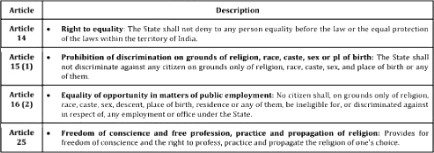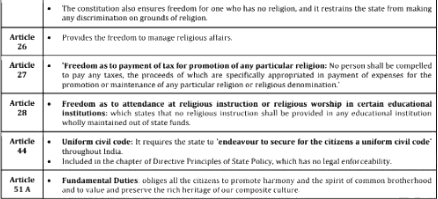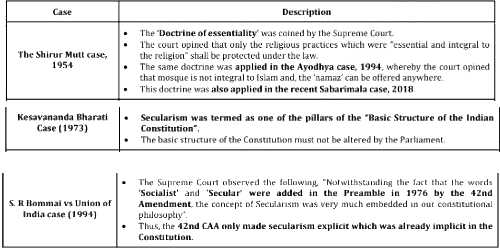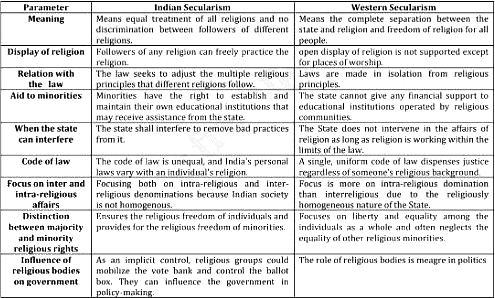UPSC Exam > UPSC Notes > Indian Society for UPSC CSE > Secularism
Secularism | Indian Society for UPSC CSE PDF Download
Definition:
The word “Secular” means “separate” from religion or having no religious basis. Secularism” itself is a principle that advocates the separation of religion from politics. Religion is open to one and all and is considered a personal choice by an individual.
INDIAN CONSTITUTION AND SECULARISM
- Before the 42nd Constitutional Amendment Act, 1976: Though the term “secular” was not initially mentioned in the original constitution, the Indian constitution has always been secular.
- Our preamble says: “WE, THE PEOPLE OF INDIA, having solemnly resolved to constitute India into a SOVEREIGN, SOCIALIST, SECULAR, DEMOCRATIC, REPUBLIC and to secure to all its citizens”..........'


Judicial Pronouncements Regarding Secularism in India

VARIOUS FEATURES OF INDIAN MODEL OF SECULARISM
- Positive concept: i.e. equal respect is given to all religions or protecting all religions equally.
- The basic feature of the Indian constitution: In the Bommai case (1994), the SC upheld that secularism was a ‘basic feature’ of the Constitution.
- Therefore, a state government involving itself in anti-secular politics may invite action under Article 356.
- Secularism as means of modernization: Our secularism is not shaped by orthodox, obsolete and narrow beliefs, but by modern values, progressive thoughts and scientific outlook.
- Equality: As per the Constitution of India, we do not have any religion as the official religion of the State.
- This prevents the State from discriminating against any citizen on the grounds of religion (Article 15).
- Tolerance and harmony: By not having a France-like tight separation between state and religion, Indian secularism reflects the tolerant attitude of the state and its people and allows the state to intervene in the name of restoring harmony.
- Secularism leading to scientific education: Indian education is scientific and predicated on the Western system.
- Education here is not a reinforcement of religious teachings.
- Room for religious reforms: It allows state intervention to help reform various evils and superstitions. E.g. The Karnataka government to curb superstitions that were against human rights made several rules.
- Secularism as a fundamental right: Secularism is constitutionally protected as it is mentioned in the preamble.
- Religious freedom is more protected and is subject to be enforced by the judiciary, in case of violation.
- Protect rights over religion: By acknowledging community-based rights for religious minorities, the rights of Indian citizens can be protected by the State. All persons are equally entitled to freedom under Article 25.
- Liberal: Indian secularism propagates liberal and egalitarian principles by reforming backwards-looking and revisionist practices through state intervention.
India Secularism VS. Secularism in West

Challenges Faced by Secularism in India
- Communalism: The growing communalism has greatly hampered the growth of genuine secularism in India.
- Forced conversion: These methods increase communalism and hamper secular values while promoting enmity between two groups.
- Limited interpretation of secularism: That is, it is limited to separation from the religion of the state. Other sub-cultural differences among Indian citizens have continued to remain strong.
- Perceptions of minority groups: There is now ample evidence that sometimes the administrative machinery does not operate impartially. E.g. the time of communal riots.
- Nexus of religion and politics: Events like the demolition of the Babri Masjid, the anti-Sikh riots in 1984, the Mumbai riots in 1992 and 1993, the Godhra riots in 2002, etc. have shown the well-established problem of communalism mingling with the government of the day.
- The Defective educational system: Encouraged people to think in terms of groups and communities, and has also failed to teach secular ideas.
- Religious intolerance: It is on the rise. The recent Delhi riots are an example of religious intolerance.
- Non-representation of minorities: Sachar Committee reported, “While Muslims constitute 14 per cent of the Indian population, they comprise only 2.5 per cent of the Indian bureaucracy.”
- Growing radicalisation: In recent years stray incidences of Muslim youth being inspired and radicalized by groups like ISIS has taken place.
Steps Taken By Government of India to promote Secularism
- Separate electorate was abolished and the universal adult franchise was introduced (Article 326) immediately after the Independence. (1950)
- National Integration Council (NIC). (1962): It was formed in 1962 under the chairmanship of the Prime minister as a means of combating the menace of communalism and ensuring the unity and integrity of the nation.
- 42nd CAA 1976: The word secular was introduced.
- National Minorities Development & Finance Corporation (NMDFC) (1994): the prime mandate is to provide concessional finance to the notified minorities for self-employment/ income generation activities.
- Ministry of Minority Affairs: Created in 2006 as an offspring of the Ministry of Social Justice & Empowerment.
- The Sachar Committee: Formed to find out the socio-economic conditions of Muslims (2005-2006).
- Ranganath Misra Commission: Formed to ascertain the status of Religious and Linguistic Minorities (2004- 2007).
- Opening of all religious places/institutions to all classes and sections of the people. For example, the Sabarimala Temple entry case.
- Multi-Sectoral Development Programme(2008-09): aims to improve the socio-economic conditions of minorities, and provide basic services for improving their quality of life in the identified minority concentration.
Welfare schemes:
- Nai Udhan
- Nai Roshni (leadership development of minority women)
- Seekho aur Kamao (Learn and Earn).
The document Secularism | Indian Society for UPSC CSE is a part of the UPSC Course Indian Society for UPSC CSE.
All you need of UPSC at this link: UPSC
|
21 videos|124 docs
|
FAQs on Secularism - Indian Society for UPSC CSE
| 1. What is secularism? |  |
Ans. Secularism is the principle of separating government institutions and the state from religious institutions. It ensures that the state remains neutral in matters of religion, treating all beliefs and non-beliefs equally.
| 2. How does secularism promote religious freedom? |  |
Ans. Secularism promotes religious freedom by allowing individuals to practice their faith or belief system without interference from the government. It ensures that no religion is favored or discriminated against, creating a level playing field for all.
| 3. What is the importance of secularism in a diverse society? |  |
Ans. Secularism plays a crucial role in a diverse society by fostering tolerance, respect, and harmony among people of different religious backgrounds. It helps prevent conflicts based on religious differences and promotes inclusivity and equality for all citizens.
| 4. How does secularism impact the education system? |  |
Ans. Secularism in the education system ensures that schools and educational institutions remain neutral in matters of religion. It allows for the teaching of diverse belief systems in an objective and unbiased manner, promoting critical thinking and intellectual freedom.
| 5. What are some challenges faced in implementing secularism in society? |  |
Ans. Some challenges in implementing secularism include resistance from religious groups seeking preferential treatment, cultural norms that prioritize one religion over others, and political influences that may try to use religion for their own agenda. Overcoming these challenges requires a strong commitment to upholding the principles of secularism and ensuring equal rights for all.
Related Searches
















